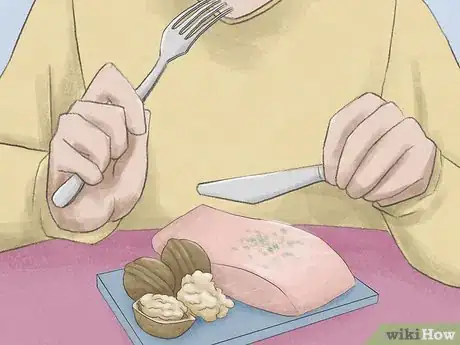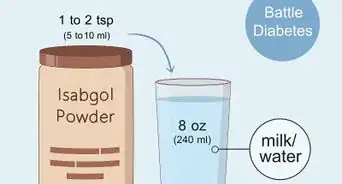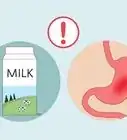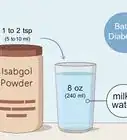This article was medically reviewed by Muhammad Khan, MD, MPH. Dr. Muhammad Khan is a Gastroenterologist, with over 10 years of experience. Dr. Khan specializes in Pediatric Gastroenterology, Hepatology, and Nutrition, and has a special focus in Therapeutic Endoscopy. He received his Bachelor’s, Master’s, and Doctorate of Medicine degrees from The University of Utah. Dr. Khan completed his residency training at Eastern Virginia Medical School, where he was inducted into the prestigious Alpha Omega Alpha honor society. He then completed his fellowship training at Lucile Packard Children’s Hospital at Stanford University. He is a Fellow of both the American Society of Gastrointestinal Endoscopy (ASGE) and the North American Society for Pediatric Gastroenterology, Hepatology, and Nutrition (NASPGHAN).
There are 13 references cited in this article, which can be found at the bottom of the page.
This article has been viewed 28,603 times.
Your digestive system consists of the organs that break down, absorb, and dispose of the foods and nutrients that you eat. Keeping your digestive system healthy is very important for your overall health and long-term quality of life. We'll walk you through the best diet for digestive health, break down the different supplements you might've heard about, and give you lifestyle tips to make sure your gut is healthy.
Steps
Dieting for Digestive Health
-
1Consume 25 to 30 grams of fiber every day. Fiber is one of the most important ingredients for good internal health. It moves food and waste through your digestive system. Consume 25 to 30 grams per day, either from your food or from a fiber-rich supplement.[1] Plan your meals around getting this minimum fiber serving.[2]
- Good sources of fiber are green leafy vegetables, whole grains, beans, lentils, and apples. Leave the skin on fruits and vegetables for extra fiber.
- Check labels to see how much fiber your food contains per serving and plan out your meals this way. If some food doesn’t come with a label, like fresh fruit, check online for its average fiber amount.
- If you have a fiber deficiency or aren’t able to get enough from your normal diet, take a fiber supplement. These are available over the counter at pharmacies.
-
2Get your protein from lean sources. Fatty protein sources like red meat can inflame your digestive system and trigger constipation. Lean sources are much better for your long-term digestive health.[3]
- Good sources of lean protein are fish, poultry, beans, and nuts.
- You don’t have to cut out red meat entirely. Just use smaller portions and limit your servings to one per week.
- The suggested daily protein intake is usually between 40 and 60 grams, depending on your size and activity level. To find your ideal intake, use this calculator from the USDA at https://www.nal.usda.gov/human-nutrition-and-food-safety/dri-calculator.[4]
Advertisement -
3Reduce your intake of processed foods. Processed and fried foods are high in saturated fats and salt. These ingredients are difficult to digest and can cause discomfort in your digestive system.[5] Avoid fried, packaged, or microwaved food as much as you can for a healthier digestive system. Opt for fresh varieties instead.[6]
- Processed foods also have little fiber and vitamins. Eating a lot of processed food will fill you up, but leave you deficient in nutrients like fiber, resulting in constipation and other digestive issues.
- Eat out less often as well. Prepared food in restaurants is usually covered in butter and salt, which can cause digestive upset.
-
4Avoid sugary foods and drinks. Processed sugar doesn’t only upset your stomach in the short-term—it also provides food for bad bacteria in your gut. A high-sugar diet creates the perfect environment for this bacteria to multiply and cause stomach aches. Soda, cakes, candy, and many other foods have an extremely high sugar content. Reduce your sugar intake to cut down on the bad bacteria in your digestive system.[7]
- The American Heart Association’s daily recommended sugar intake is 25 grams for women and 32 grams for men. Keep your consumption within this range.[8]
- The fizz from soda can also upset your stomach and cause bloating. If you still want a fizzy drink, try seltzer instead. This has no sugar or calories.
- If you think you don’t eat a lot of sugar, check the labels on the food you buy. You might be surprised how much sugar is in prepared food.
-
5Eat slowly to prevent overeating. Piling food into your mouth stresses the digestive system. If you eat too quickly, you’ll end up too full because your brain can’t make you feel full soon enough. Relax and eat slowly, even if you’re very hungry. Chew the food completely before you swallow it. Then you’ll feel full before you’ve eaten too much.[9]
- If you’ve just eaten and still feel hungry, wait a few minutes. Your brain might catch up to your body and make you feel full by that time.
Taking Digestive Supplements
-
1Ask your doctor before taking any health supplements. Health supplements are not strictly regulated, so they may have unintended side effects. They could also interact with medications you take. Before you start taking any supplements, have a conversation with your doctor to make sure the supplements are safe and won’t have any negative effects on your health.[10]
- Take all supplements according to their listed directions or the instructions you doctor gives you.
-
2Take probiotics to aid in digestion. Probiotics are known as “good bacteria” because they aid in the digestive process. Many digestive issues are caused by a deficiency of probiotics in your gut. Try taking some probiotic supplements and see if you notice an improvement in your digestive health.[11]
- Probiotic supplements are available in health stores and pharmacies. Speak with your doctor or pharmacist to find the best product for you.
- Probiotics take some time to work. Don’t expect to see many changes before you’ve been taking supplements for a few weeks.
- Plain Greek yogurt is also high in probiotics. Eat a few servings per week if you prefer this over taking supplements.
-
3Take digestive enzyme supplements if your body has a deficiency. Digestive enzymes usually come from the pancreas and help break down food. Sometimes the body doesn’t make enough enzymes naturally, which inhibits efficient digestion. People with deficiencies can take enzyme supplements to replace missing enzymes and move digestion along.[12]
- If you don’t have any deficiency in digestive enzymes, doctors don’t recommend you take enzyme supplements. They will have no effect unless you’re deficient in enzymes.
-
4Consume an L-glutamine supplement to protect your GI. L-glutamine creates a barrier that protects your GI tract from toxins, allergens, or pathogens. Since leaked toxins, allergens, and pathogens may cause illness or autoimmune conditions, L-glutamine may help protect your overall health, as well as your digestive system. Take your L-glutamine supplement daily as directed on the label.[13]
- Remember to check with your doctor before you start taking a new supplement. Additionally, ask your doctor for the best dosage amount for you.
-
5Use peppermint oil capsules to relieve irritable bowel syndrome. Studies have found that peppermint oil is effective in relieving some digestive discomfort, including irritable bowel syndrome. If you suffer from IBS, try getting a bottle of peppermint capsules from a pharmacy, vitamin store, or online. Take these capsules as directed.[14]
- Remember that peppermint oil specifically has a positive effect on IBS symptoms, not peppermint leaves. Eating the leaves are adding them to your tea won’t have the same effect.
Developing Healthy Lifestyle Habits
-
1Eat on a regular schedule and don't skip meals. Skipping meals and eating sporadically throw your digestive system off balance. Sticking to a regular schedule lets your body prepare itself for digestion and stay regulated. Try to set an eating schedule and stick to it throughout the week.[15]
- Experts recommend eating 3 balanced meals per day, with some healthy snacking in between. Remember not to skip breakfast. Even if you're in a rush, eat breakfast to keep your digestion on schedule.
- Keep a food diary if you don't keep track of your eating habits. Write down what you eat and the time. Then review this information to see if you're eating on a regular schedule or at sporadic times.
- If you move around a lot at work and don't know when you'll be able to take a break, try packing some small snacks with you. Then you can put something in your stomach quickly to keep your digestion on a schedule.
- Finish eating at least 3-4 hours before you go to bed so your food has enough time to properly digest.
-
2Drink 11.5 cups (2.7 liters) to 15.5 cups (3.7 liters) of water per day. Water helps move food through the digestive system smoothly. It also softens waste. The daily recommended water intake is 15.5 cups (3.7 liters) for men and 11.5 cups (2.7 liters) for women. Use these levels as a goal to keep your digestive system healthy. This is especially important in a high-fiber diet, because fiber clumps together without sufficient water.[16]
- The recommended water amounts are a useful guideline, but you may need more if you're exercising or working outside. Drink whenever you feel thirsty to stay hydrated.
- As a general rule, drink a glass of water with every meal to aid in digestion.
- Drinking water is very important if you’re suffering from either diarrhea or constipation. Diarrhea drains your body of liquids, so replace them to avoid dehydration. Constipation is often caused by insufficient water in the digestive system, so drink more if you’re suffering from this problem.
-
3Exercise 3-5 days per week. Staying active is good for your overall health. Exercise stimulates the digestive system by getting your muscles moving and bringing blood to your internal organs. Get on a regular exercise regimen. Commit to exercising 3-5 days every week for 30 minutes a day to maintain your digestive health.[17]
- Focus on cardio exercises more so than strength exercises. The movement from running, biking, or aerobics helps move food through the digestive system better than weight lifting.
- You don’t have to workout hard to get the benefits of exercise. A good walk for 30-60 minutes is great for staying in shape.
-
4Reduce your stress and anxiety. Stress and anxiety can take a toll on your digestive system. All people respond differently to stress—some get constipated, some have diarrhea, and some just have a stomachache. You can avoid these GI upsets with some stress-relieving activities.[18]
- Exercise is great for reducing stress and clearing your head.
- Listening to music, drawing, or writing help reduce your anxiety without breaking a sweat.
- Try meditating to relax your mind.
-
5Limit your caffeine and alcohol intake. Caffeine and alcohol can irritate your digestive system and cause heartburn or diarrhea. If you have problems with these conditions, consider reducing your caffeine and alcohol intake. Limit your consumption to 1 or 2 cups per day for the best results.[19]
- Consider herbal teas that are naturally decaffeinated.
- If you do drink coffee, reduce the amount of sugar you add.
-
6Quit smoking or don’t start if you don’t smoke. Smoking is very harmful to the digestive system. In the short-term, it can cause ulcers, heartburn, acid reflux, and bowel problems. Long-term, it can cause cancers of the GI tract. If you smoke, quit as soon as possible to improve your overall health. If you don’t smoke, then don’t start.[20]
Expert Q&A
-
QuestionHow can I improve my digestion?
 Muhammad Khan, MD, MPHDr. Muhammad Khan is a Gastroenterologist, with over 10 years of experience. Dr. Khan specializes in Pediatric Gastroenterology, Hepatology, and Nutrition, and has a special focus in Therapeutic Endoscopy. He received his Bachelor’s, Master’s, and Doctorate of Medicine degrees from The University of Utah. Dr. Khan completed his residency training at Eastern Virginia Medical School, where he was inducted into the prestigious Alpha Omega Alpha honor society. He then completed his fellowship training at Lucile Packard Children’s Hospital at Stanford University. He is a Fellow of both the American Society of Gastrointestinal Endoscopy (ASGE) and the North American Society for Pediatric Gastroenterology, Hepatology, and Nutrition (NASPGHAN).
Muhammad Khan, MD, MPHDr. Muhammad Khan is a Gastroenterologist, with over 10 years of experience. Dr. Khan specializes in Pediatric Gastroenterology, Hepatology, and Nutrition, and has a special focus in Therapeutic Endoscopy. He received his Bachelor’s, Master’s, and Doctorate of Medicine degrees from The University of Utah. Dr. Khan completed his residency training at Eastern Virginia Medical School, where he was inducted into the prestigious Alpha Omega Alpha honor society. He then completed his fellowship training at Lucile Packard Children’s Hospital at Stanford University. He is a Fellow of both the American Society of Gastrointestinal Endoscopy (ASGE) and the North American Society for Pediatric Gastroenterology, Hepatology, and Nutrition (NASPGHAN).
Board Certified Gastroenterologist Pay close attention to what you put in your body, as well as what comes out. Stay away from anything overly-processed, like fast food and pre-packaged food.
Pay close attention to what you put in your body, as well as what comes out. Stay away from anything overly-processed, like fast food and pre-packaged food. -
QuestionHow often should a healthy person poop?
 Muhammad Khan, MD, MPHDr. Muhammad Khan is a Gastroenterologist, with over 10 years of experience. Dr. Khan specializes in Pediatric Gastroenterology, Hepatology, and Nutrition, and has a special focus in Therapeutic Endoscopy. He received his Bachelor’s, Master’s, and Doctorate of Medicine degrees from The University of Utah. Dr. Khan completed his residency training at Eastern Virginia Medical School, where he was inducted into the prestigious Alpha Omega Alpha honor society. He then completed his fellowship training at Lucile Packard Children’s Hospital at Stanford University. He is a Fellow of both the American Society of Gastrointestinal Endoscopy (ASGE) and the North American Society for Pediatric Gastroenterology, Hepatology, and Nutrition (NASPGHAN).
Muhammad Khan, MD, MPHDr. Muhammad Khan is a Gastroenterologist, with over 10 years of experience. Dr. Khan specializes in Pediatric Gastroenterology, Hepatology, and Nutrition, and has a special focus in Therapeutic Endoscopy. He received his Bachelor’s, Master’s, and Doctorate of Medicine degrees from The University of Utah. Dr. Khan completed his residency training at Eastern Virginia Medical School, where he was inducted into the prestigious Alpha Omega Alpha honor society. He then completed his fellowship training at Lucile Packard Children’s Hospital at Stanford University. He is a Fellow of both the American Society of Gastrointestinal Endoscopy (ASGE) and the North American Society for Pediatric Gastroenterology, Hepatology, and Nutrition (NASPGHAN).
Board Certified Gastroenterologist A healthy person should poop anywhere from once every 3 days to 3 times a day. This should be a comfortable range to reach, especially if you're eating 25-30 grams fiber each day.
A healthy person should poop anywhere from once every 3 days to 3 times a day. This should be a comfortable range to reach, especially if you're eating 25-30 grams fiber each day.
References
- ↑ Muhammad Khan, MD, MPH. Board Certified Gastroenterologist. Expert Interview. 24 August 2021.
- ↑ https://www.gesa.org.au/resources/patients/maintaining-a-healthy-digestive-system/
- ↑ https://www.hopkinsmedicine.org/health/wellness-and-prevention/5-foods-to-improve-your-digestion
- ↑ Muhammad Khan, MD, MPH. Board Certified Gastroenterologist. Expert Interview. 24 August 2021.
- ↑ Muhammad Khan, MD, MPH. Board Certified Gastroenterologist. Expert Interview. 24 August 2021.
- ↑ https://www.gesa.org.au/resources/patients/maintaining-a-healthy-digestive-system/
- ↑ https://my.clevelandclinic.org/health/articles/14122-digestive-tract-health
- ↑ https://www.heart.org/en/healthy-living/healthy-eating/eat-smart/sugar/how-much-sugar-is-too-much
- ↑ https://www.gesa.org.au/resources/patients/maintaining-a-healthy-digestive-system/
- ↑ https://ods.od.nih.gov/HealthInformation/DS_WhatYouNeedToKnow.aspx
- ↑ https://www.nhs.uk/live-well/eat-well/good-foods-to-help-your-digestion/
- ↑ https://www.health.harvard.edu/staying-healthy/gut-reaction-a-limited-role-for-digestive-enzyme-supplements
- ↑ https://www.ncbi.nlm.nih.gov/pmc/articles/PMC4369670/
- ↑ https://nccih.nih.gov/health/peppermintoil
- ↑ https://www.gesa.org.au/resources/patients/maintaining-a-healthy-digestive-system/
- ↑ https://www.mayoclinic.org/healthy-lifestyle/nutrition-and-healthy-eating/in-depth/water/art-20044256
- ↑ https://www.gesa.org.au/resources/patients/maintaining-a-healthy-digestive-system/
- ↑ https://www.health.harvard.edu/topics/digestive-health
- ↑ https://www.nhs.uk/live-well/eat-well/good-foods-to-help-your-digestion/
- ↑ https://www.hopkinsmedicine.org/health/conditions-and-diseases/smoking-and-the-digestive-system












































































Medical Disclaimer
The content of this article is not intended to be a substitute for professional medical advice, examination, diagnosis, or treatment. You should always contact your doctor or other qualified healthcare professional before starting, changing, or stopping any kind of health treatment.
Read More...